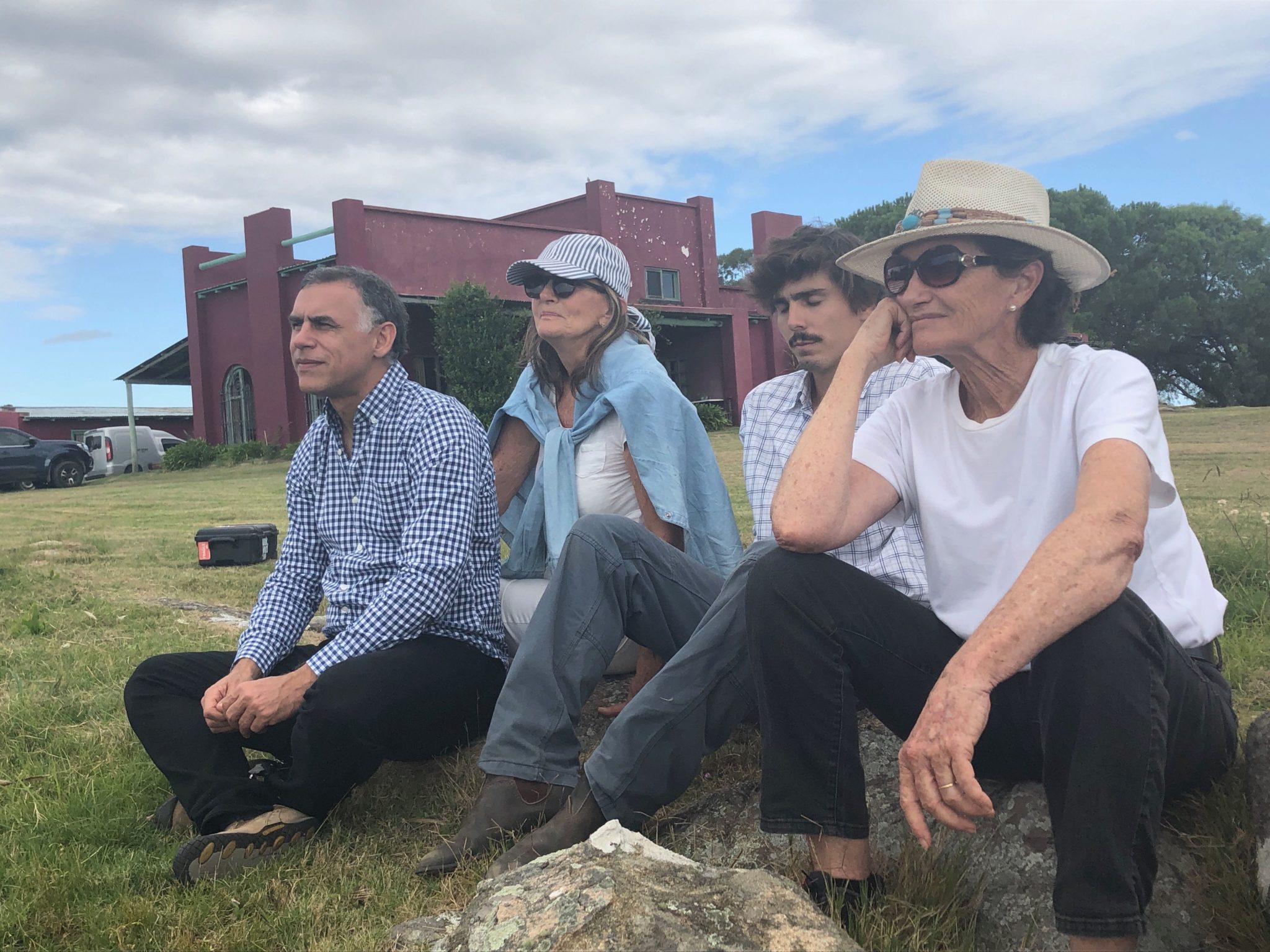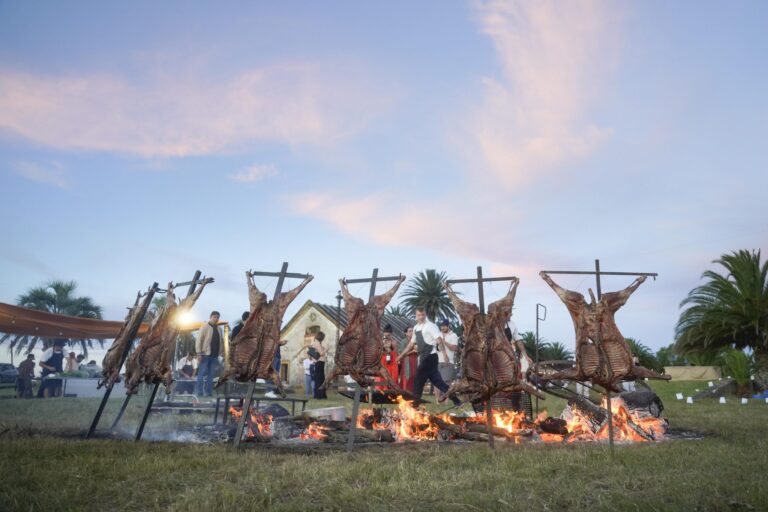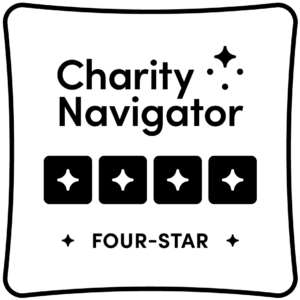When I was in my teenage years, our family spent vacations in the famous Uruguayan beach resort of Punta del Este (as many Argentines did at the time) and explored the beautiful countryside just a few kilometers inland, where friends and family ranched. I loved this endless landscape, dotted by cattle, horses, and sheep as far as the eye could see. A few years ago, for my father’s 80th birthday, we returned with the whole family to celebrate the benchmark. I rediscovered the area and fell in love with it all over again.
Grassfed livestock production is a deep part of the tradition and identity of Uruguay. Fortunately, there is a strong regenerative ag movement in the region, led by Voisin fans and young leaders determined to see Uruguay at the forefront of this movement and avoid at all cost the fate of many South American countries, blindly following industrial livestock production models that are already understood as obsolete for their impacts on the planet, people and climate. 67% of Uruguay meat production is exported to key international markets such as EU, USA, and China, and they are proud to have a countrywide system that provides 100% digital traceability from farm to market for all their meat production. INAC’s Annual Statistics Report can shine some light on the industry for those interested in digging deeper.
Yvon Chouinard wrote that “no animal is so stupid and greedy as to foul its own nest – except the human animal”. I am in awe at how many humans in Uruguay are wise and committed to keeping their nest clean and healthy. Uruguay, very much like New Zealand, is proud to have a strong country brand, maybe as a result of their agriculture-driven relationship. Just as “Pure New Zealand” has driven attention to the country down under, “Natural Uruguay” has certainly put a spotlight on the nation. But in the last couple of years, Uruguayans decided “Natural” was not good enough of a differentiation, and that the country’s unique ecology and livestock production models perfectly positioned it to claim the brand of “Uruguay Regenerativo”, and they are lively serious about making it an authentic claim.
There is a sense of heightened awareness among the livestock producers and grass growers in Uruguay; a deep desire to protect and enhance the native landscapes; a pride in having more 4-legged animals than people; and a tangible excitement about leading the regenerative movement as a country with advocacy, education, policy, practice, and on the ground results.

The Holistic Management Emergence
Allan Savory and Jody Butterfield’s visit to the country in 2016 on occasion of the World Meat Congress was, for Savory Global, the beginning of an inspiring collaboration. I was there to witness its conception.
Being a relatively small and progressive country, innovations are quickly disseminated among producers, institutions, and businesses, and the remarkable concentration of young and shrewd entrepreneurs in the area made it a pleasure for me to see the emergence of a promising collaboration around regenerative agriculture and Holistic Management. A community of learning and practice is blossoming, with partners from Ovis21 (Savory Hub in Argentina) and local leaders bringing Holistic Management to enrich the already successful and burgeoning PRV (Pastoreo Racional Voisin) community.
I am particularly excited to be part of an incredible group of changemakers that span three generations. Among them amazing and powerful women that I have had the pleasure and fortune to meet and learn from, women such as Patricia Cook, Althea Ganly, Magdalena Urioste, Chris Wells, Jimena Perez Rocha, Natalia Bajsa, Heidi Lender, and Miroslava de Alvear to name a few… all of them, in their own ways, from their unique position as farmers, activists, strategists, technicians, mothers, entrepreneurs, artists… are making Uruguay (and the world) a better place for current and future generations.

A Place of Inspiration
I visited Uruguay in early April to meet with some of these women and the men working by their side in the lovely town of Aigua. We gathered and shared our vision for the emerging movement. You will find their voices in the videos captured by our friend Guillermo Fernandez (Instagram: @guillermo_ez), soulful photographer and videographer, and a partner in arms deeply committed to helping spread the word with his genius and art.
Magdalena and Santiago Urioste hosted us on their beautiful ranch, Valle Sol, an oasis spanning over 600 hectares (~1,500 acres), uniquely Uruguayan but with a resemblance to the peaceful Tuscan countryside. The Uriostes bought the farm 6 years ago, and under their stewardship and holistic planned grazing, they increased its carrying capacity from 130 head of cattle to 300 head of cattle, 100 sheep, geese, donkeys, horses, and more. Magdalena told us the place was silent when they moved. With time and management, birds began to chirp again and all life flourished.
Global Insertion
This afternoon marked the beginning of a chain of new opportunities. The first one right away – a key gathering of producers and national and international institutions took place just a few kilometers away. FAO, through the Global Environment Facility (GEF) and the UINC (Union Internacional para la Conservación de la Naturaleza) is convening producers and implementing a global project centered on the sustainable management of grasslands. Institutions present at the workshop included the Ministry of Livestock, Agriculture, and Fisheries (MGAP).
The project objective is to build capacity among local and national stakeholders in the grasslands of Uruguay to evaluate land degradation and make better decisions to foster regenerative land and livestock management. The global strategy rests on three pillars: 1. Development of a methodology for evaluation of land health; 2. Enhanced decision making; and 3. Capacity building for the implementation of regenerative practices.
Our community, led by young and passionate local folks such as Martin Benenati, is moving forward with a strongly aligned proposal to learn from the current efforts and integrate learning and implementation of EOV as an outcome-based, field-level monitoring methodology, together with full Holistic Management training for participating producers.
This initiative, if (when) funded, will allow a sizeable network of key Uruguayan Institutions and livestock producers to come together in an effort to increase the productivity, resilience, and profitability of the Uruguayan grasslands and communities. It will also allow producers to enter a more differentiated market segment both domestically and internationally, via the efforts of local market players, such as Uruguayan Meats or inserting themselves in the Savory global Land to Market program. With increasing demand pressures by China, Uruguay is faced with an incredible opportunity to lead with a regenerative model for increased production and land health, but also with a threat, a double edge sward, if the context for decision making from the policy level to the farmer becomes to just to meet the demand at all costs.
It is a golden moment, and the regenerative community in Uruguay will have the unprecedented responsibility to lead with a long view, with the needs and interests of future generations in mind, in the current global climate predicament. I am optimistic.

Pampeanas Regenerativas
Another most inspiring outcome of the gathering, and triggered by the group of women present at Valle Sol, was a decision by INAC’s Lautaro Perez Rocha and Lorena Otegui to sponsor and co-design a one of a kind gathering for and by women (self-named Pampeanas Regenerativas) in the regenerative movement in Uruguay and neighboring countries this coming September.
The regenerative women in Uruguay are a force to be reckoned with, and will play a crucial role in guiding, informing, modeling, and supporting wih education, advocacy and moral courage the future of meat and soil in the global community. Special international invited guests include, among others, Efecto Manada’s leader Isidora Molina (Savory Hub in Chile), Sustainable Dish’s Diana Rodgers, who will be filming for her highly awaited documentary Sacred Cow – the nutritional, environmental and ethical case for better meat, Mimi Hillenbrand of 777 Bison Ranch, and Regeneration International ‘s Argentine Ercilia Sahores.
Finally, the momentum in the region will be taken all the way to COP25, hosted this year in Santiago, Chile in December. In collaboration with Regeneration International, Savory Hubs in South America and scientific advisors and partners will come together to support and advance the operationalization of the French 4×1000 initiative. Key local and international partners will meet before, during, and after the event to advance grasslands and livestock policy and management programs towards a holistic worldview, design, and implementation.
The “Southern Cone” is making history and I am a proud witness and partner of this magnificent journey.


